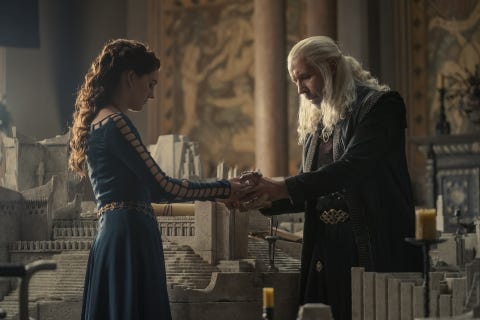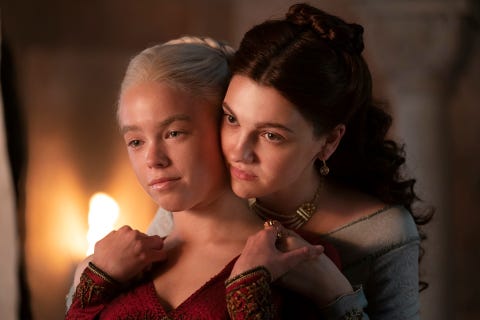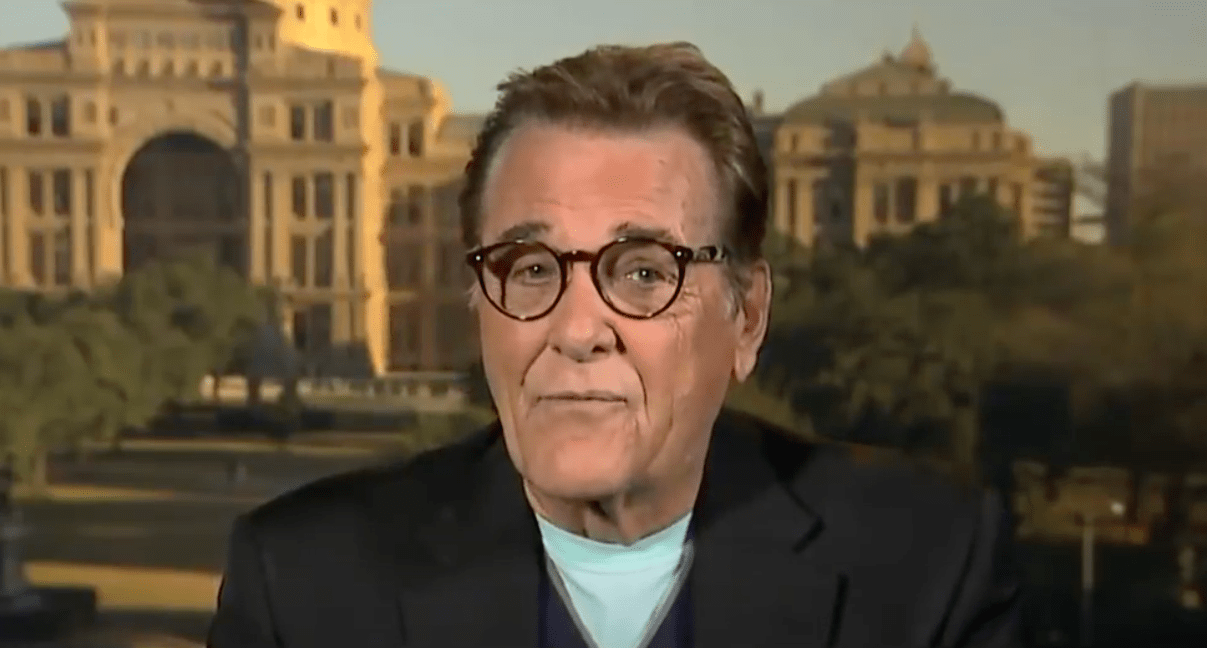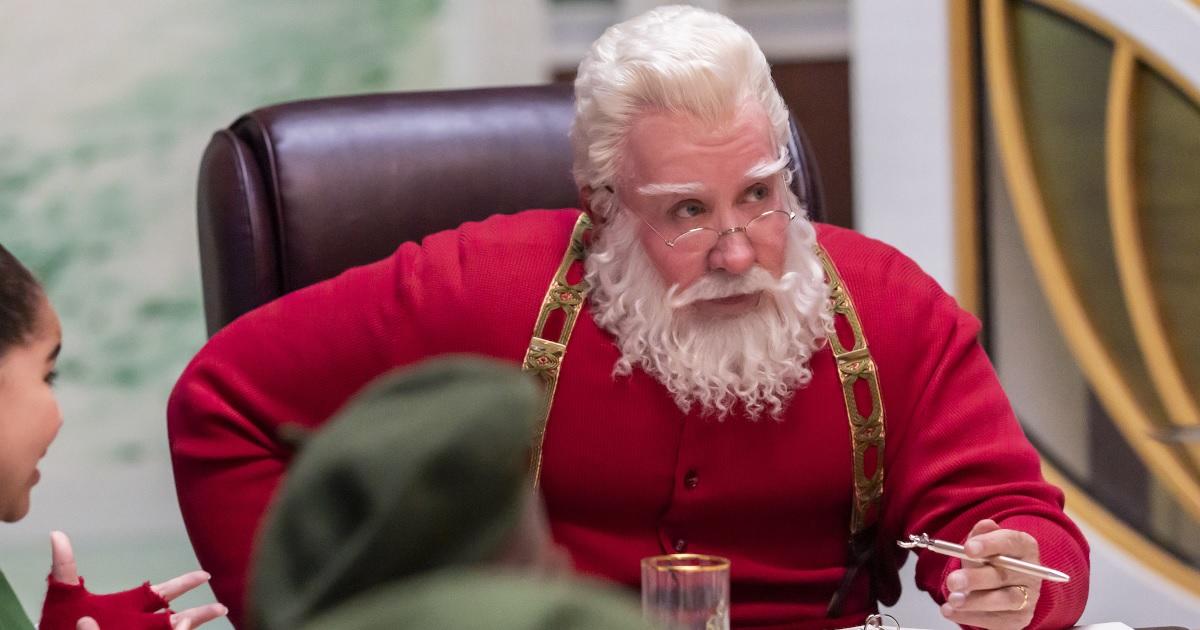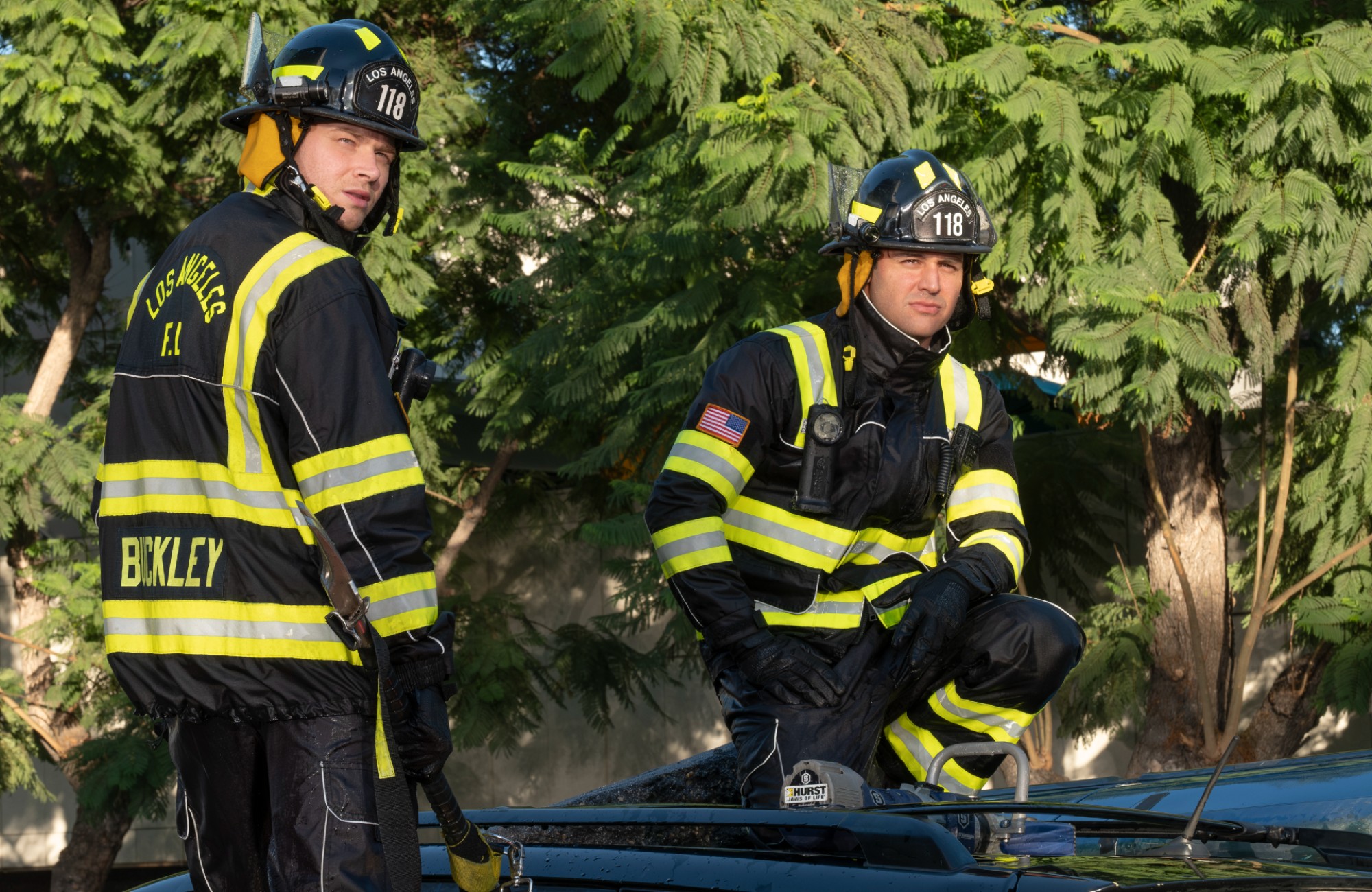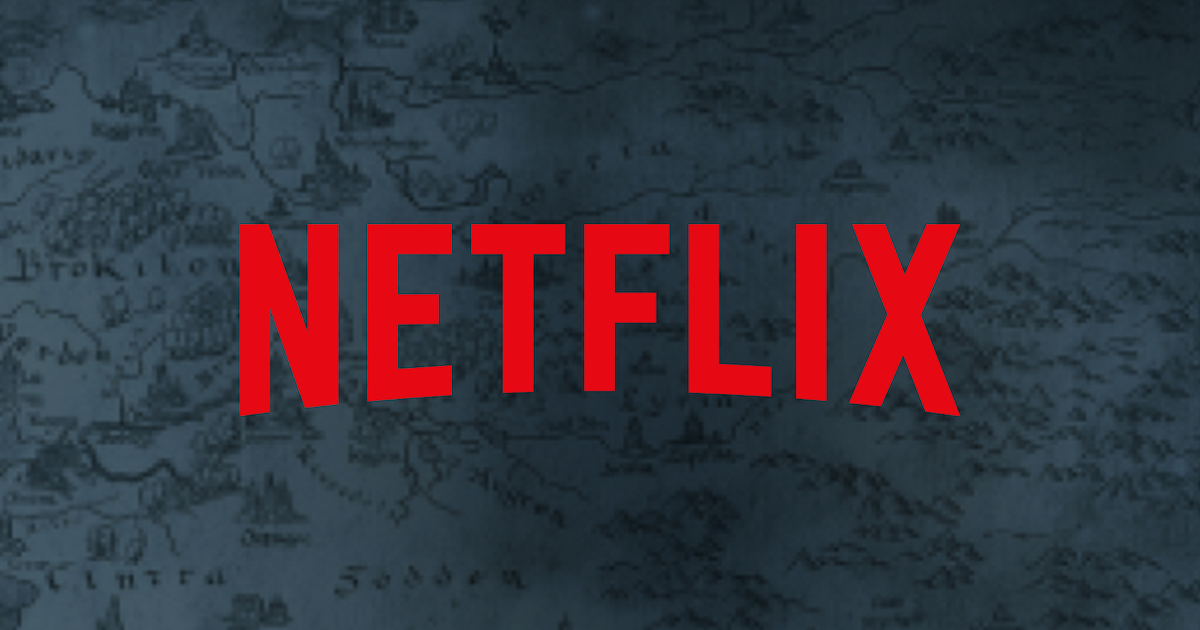Emily Carey On Her Final House of the Dragon Scenes: ‘We See That Spark of the Angry Woman’
Emily Carey is leaving. Unless you’re well-practiced in the particular art of spoiler-dodging online, you knew this was coming. HBO has been forthcoming about very little when it comes to their hit Game of Thrones prequel series, House of the Dragon, but they’ve been transparent about this: After episode 5, the actresses portraying Rhaenyra Targaryen and Alicent Hightower will be replaced with older ones, thanks to a significant mid-season time jump. Emma D’Arcy will take over for Milly Alcock, and Olivia Cooke for Carey. But anticipating the move does little to soften the actual blow, given how audiences have connected with Alcock and Carey’s version of these characters.
Carey, 19, is thankful for the appreciation, if a little relieved she’s not locked into a multi-year contract. And she’s perhaps not unhappy she needn’t portray the more ruthless version of Alicent, a sworn enemy of Rhaenyra in the coming Dance of the Dragons civil war. Carey’s young Alicent is not a villain, as Carey herself proclaimed to an audience at San Diego Comic-Con earlier this year. At the time, fans weren’t thrilled with this idea. But in hindsight, it’s true: Her Alicent is a victim more than an instigator, a witless child forced to play the games of a toxic hierarchy. Only in episode 5 does she make the first in a long string of power moves, lashing out for a sliver of control.
That episode 5 scene, in which Carey wears the colors of House Hightower to signal her loyalties at Rhaenyra’s nuptials, took numerous takes for Carey to get right. It was her final shot, her parting gift to a series that has already begun to change the Wonder Woman actress’s life. But she’s happy with where she leaves Alicent as Cooke takes over.
“I had these butterflies in my stomach, and I was like, ‘This is the moment, Em. This is the last take,’” Carey says. “‘This is your last big moment in this show. You’ve got to make it and make it happen.’ I channeled that from Emily’s thought process, which went very naturally into Alicent’s thoughts of, ‘This is your big moment. You’re making your entrance.’”
Below, Carey discusses with ELLE.com how she settled into the world of Westeros with little initial familiarity, how she grew comfortable acting alongside Alcock and Paddy Considine, and whether she would consider returning to the role in the future.
Because you weren’t originally a Thrones superfan, what was your entry point to this role? Where did you start to acquaint yourself with this massive world, so you’d understand it while you were in it?
It’s a lot. I don’t think I can recall my entry point. First of all, our show is—there’s so much newness [apart from] Game of Thrones. Yes, there’s a lot that correlates and responds, but also we’re a prequel. The books gave me a lot more context as to the world and the history behind it than Game of Thrones [the show] did.
But what was great about Thrones was watching it put into context what was at stake for these characters. I tried watching it the second that I booked [Dragon]. I was also trying to read our script at the same time. And as I said, I’m not into this genre at all; I much prefer a cheesy rom-com, which is not really in Thrones. So there was kind of a language barrier. It felt very Shakespearean, which is something that I’m not used to.
So I would read it and be like, “Hold on. This person isn’t actually that person because their names sound the same, but then that’s a place, not a person.” It was so confusing. And then of course, trying to watch the original show at the same time? I was getting so lost, so I would pause for a bit. And then I picked up whenever I had breaks whilst we were shooting. By Christmas, I managed to watch all of it.
As a viewer of Thrones and as an actress on Dragon, how would you describe the difference between the two? Not so much in terms of plot, but in mentality and aesthetic and approach?
I think, for me, the main difference was approach. How the creative team and the producers approached this show, in comparison to the original, was very, very different. As a 17-year-old young woman coming onto this show, never having seen Game of Thrones before, and just watching that first season in one go—I was a bit like, “This is really scary. What are they going to make me do in this show?”
It was daunting. And then, the second I stepped into the rehearsal room, they had an open dialogue going about feminism and women in this show, and how the intimacy scenes were going to be handled, and a multitude of other things. And [those concerns] were sort of put to bed very, very quickly. And we all felt very comfortable. So I think the approach for this, at least, from season 1 of Game of Thrones is very, very different.
I think visual-wise, of course, we’re seeing the Targaryen dynasty at its peak. This is the most extravagant it ever was in its history. So I think, visually, it’s a lot more magnificent than Thrones.
In the book, Alicent is a pretty obvious villain. We’re meant to see her as such. But in the show, there’s much more expansion into why she makes the choices she makes, the ways she’s pressured from childhood into these decisions, how she’s a product of her surroundings. And we needed to feel that tension most keenly between you and Milly Alcock, who plays Young Rhaenyra. I’m curious how the two of you jumped into that dynamic, knowing how much of the show hung on your connection with each other.
I think we were quite lucky, in the sense that Milly and I get along really well in real life as well. She’s like a big sister. She’s amazing. She’s so cool. But we made a point to get to know each other before we stepped on set. So we FaceTimed a few times while she was still in Australia. Looking back on it, we were so cute and polite to each other. And then we met in the rehearsal period, and we went for drinks, and we just talked about how crazy all of this was.
I knew, for her, she’d moved literally across the world in a global pandemic. And, for me, it was my first job as an adult. It was my first job without a chaperone and being completely on my own. So we were just sort of clinging to each other for dear life at the beginning of the process, and we still are, to be honest.
We were very lucky with this to have such a long rehearsal period. It kind of felt like a play. It felt like theater in the rehearsals, which for me was so much fun because that’s how I started. And so we worked really hard at this relationship, offscreen and onscreen, because we knew how much weight it needed to carry. Because, as you said, it deteriorates so quickly, you have to show that closeness just straight from the get-go.
We had so many conversations and explored teenage friendship. Because I think it’s one of the most interesting dynamics you can put on screen, a friendship between two young teenage girls. I think there’s so much depth to it, and there’s so much you can do with it.
The best friend that you have at 14—as a woman, especially—you think it’s going to be your best friend forever. There’s no other option. It’s like a partner. You just want to be with that person all the time, and you think it’s never going to end. And I truly think you’re never going to have that closeness ever again. It’s toeing the line between platonic and romantic because it’s just all-consuming love for that one person. And so that’s something that we talked about a lot, and I think it was so important.
One of the things I loved throughout your scenes as Alicent was how we, as an audience, could watch the myriad emotions moving across your face. We could see the conflict and the desire and the disgust and the affection as Alicent gets close with Viserys. How did you and Paddy Considine make this extremely strange dynamic feel comfortable for you as actors, but as complicated as it needed to be on screen?
It’s interesting what you said about being able to see Alicent sort of cycling through emotion, because I remember—there were two scenes where there were so many different ways for me, as an actor, that I could have played it.
The first one is the go-visit-the-king, wear-your-mother’s dress scene with Otto. And then the scene directly following that, where she goes in to see Viserys for the first time. As an actor, there were so many routes I could have taken it. And it was impossible to know which way. My first proper day on set was that scene with Paddy. And so I was very scared.
And I remember saying to Miguel [Sapochnik, co-showrunner], “How should I play this? Because it could be the fear she’s alone in this room with a man, the king. It’s also her best friend’s dad. It’s very weird. Is it the determination that she needs to get the job done? Is it the duty? Is it the greed for power? Is it the upset that she’s been put into this situation?” And then Miguel just went, “Yes.” [Laughs.]
He was like, “Play with this confusion. Play it. Just all of it.” I’m glad that reads on screen because I wanted to keep the confusion. And Paddy is, of course, a phenomenal actor and also just a gem to work with. He’s so caring and kind. And after every take he’d look at me and go… [Thumbs up.] I’d be like, “I’m good. Thanks, Padds. We’re doing good. We’re doing good.” He’d check in every time to make sure that I was happy with the work that we were doing.
Of course, again, being 17 when I started this job and reading the script going, “It’s a fully grown man. I’m very scared.” I didn’t know how to react. And then me and Paddy ended up bonding over Drag Race. He’s a huge Drag Race fan. And so am I. So unlikely friendship formed, which I think reflects what’s on screen.
It does.
I think Alicent and Viserys bond over this shared trauma. They find this unlikely bond, this emotional vulnerability with one another that they can’t really have with anyone else.
In a weird way, I think Alicent knows how to comfort him because she’s seen her own father go through something similar. She knows how men respond to emotions in this world, especially within the walls of the Red Keep. She knows what it’s like to have a huge amount of pressure on your shoulders.
We always said that they had a huge amount of love for each other, but they were never in love. I think Viserys and Aemma were 100 percent in love, meant-to-be soulmates.
A lot of the time, Miguel would actually direct Paddy when the camera was on me because he knows that’s how I work. He has an individual process for every person he works with, and he makes you feel like you’re the only person in the room, which is so incredibly rewarding. But he would notice that sometimes I get in my head a little bit. And so he’d be like, “Okay, you don’t need to think about it. I know you. You just work very organically.” So he’d direct Paddy and would know exactly what to tell Paddy, and Paddy would play the exact right thing to provoke the right reaction out of me, which I think is absolutely fascinating.
I know you left Twitter for a while because of Thrones fans who disagreed with your take that Alicent is not a villain. Do you still feel defensive of her?
One hundred percent. I think, if you have a strongly formed opinion of Alicent, whether you hate her or love her, it means that I’ve done my job well. You know what I mean? But it was something I said at Comic-Con, all I said was she is not the villain, and that clip was taken out of context. And what people didn’t see is, first of all, that George [R.R. Martin] actually backed me up after I said it.
And he writes great characters. That’s absolutely what he loves to do. He writes characters that you can root for one day, and then they do something completely disgusting the next day and you hate them for it, but you still want to love them. And I think people forget that when I’m talking about Alicent I’m talking about my Alicent. [Dragon] was so top secret we haven’t even read the scripts that were not in. So I haven’t read Olivia’s Alicent; I haven’t seen Olivia’s Alicent.
Really?
It’s 20 years between my Alicent and hers. They’re two different versions of the same person. Circumstance changes that. People pushing her, pushing her around. People are expecting to find this angry woman, and they’re now being presented with a young girl who is being pushed into becoming this angry woman. Of course, I read the book. I know that she makes some questionable choices.
But I think what’s clear in the first few episodes is that my Alicent doesn’t have a choice. And even when she’s given this privilege of choice, it’s still being made by men. The choice is still constantly, consistently, being made by men. And that’s what’s so heartbreaking about the demise of the friendship because neither [Rhaenyra or Alicent] are in control at any point in the story.
But even the first half of the season features so many time jumps. How did you navigate embodying Alicent in each of these slightly different iterations?
I’ll be honest. It was difficult. I could go from playing Alicent at 14 into Alicent at 18, Alicent with children, being a grown woman, into a child version of Alicent, all within the same day. I’d go from one costume to the other. I’m so glad that we had the rehearsal period because, from the rehearsal period, I could figure out what each of these versions of Alicent were.
I journaled as my character because I find that’s something that helps me. And, especially with these time skips, I found it so useful to be able to write at the end of a rehearsal day, and then come back to it literally five months later and reread it again and again, and it would get me back into the exact frame of mind that I was in that day.
I think, by episode 4, that’s where she’s really found her feet as queen. Because that big moment in episode 5, the green dress moment, it goes against everything and every way that I would describe Alicent in 1, 2 and 3. It’s like, if I were to describe Alicent’s personality, I would not go, “Oh yeah, she’s going to crash a wedding and wear the wrong color and start a war.” That’s not what she would do. So I had to find this very, very gradual journey of years and years to get to that final point in 5, where we see that spark of the angry woman that Olivia is then going to play from 6 onwards.
I anticipate that scene getting a lot of traction online. Is it overwhelming to you, being on a series this gigantic in both scope and fanbase?
Inside these four walls of my little flat, nothing has changed. I went out to buy sweet potatoes yesterday. It’s the first time I’d left the house since the show had came out, had a mask on, was picking up a reusable produce bag and filling it with sweet potatoes, and someone was like, “I love House of Dragon!” And I was like, “Oh, cool.” I kind of forget that I’m in it, I guess.
But then I’m reminded 24/7. My sponsored ads on every form of social media: House of Dragon, House of Dragon. I switch on my TV, I go to watch something on Now TV or Sky News, it’s like House of Dragon, House of Dragon. On buses and billboards, I step outside my house, and the bus stop is like, House of the Dragon. It’s overwhelming. It’s intense. I’ve been building a lot of Lego to cope.
I know this is the last we expect to see of you in this show. But would you return, should there be some sort of flashback scene in future seasons?
I mean, in all honesty, I don’t know. This show is so incredibly top secret, even when we were working on it, we weren’t even allowed hard-copy scripts; everything was on iPads.
If I was offered, I think I’d love to go back, depending on what I’m doing. But I guess we’ll see. I mean, I’m quite glad that I get this huge career push, and I’m not tied into something for 10 years. I get this big platform, and hopefully I don’t burn out. And I can use it to move on and do other cool things. I mean again, we’ll see. I don’t know. But, so far, just riding in the wave.
This interview has been edited and condensed for clarity.
Lauren Puckett-Pope is an associate editor at ELLE, where she covers news and culture.

